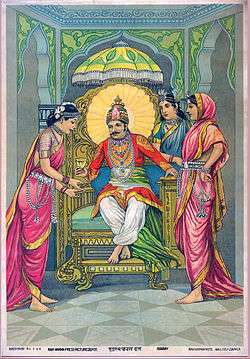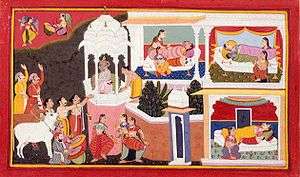Kaikeyi
| Kaikeyi | |
|---|---|
 Dasharatha promises to banish Rama per Kaikeyi's wishes(A folio from Ayodhya Kand manuscript) | |
| Epic | Ramayana |
| Information | |
| Family |
Ashwapati (father) Dasharatha (husband) |
| Children | Bharata |
Kaikeyi (Sanskrit: कैकेयी, IAST: Kaikeyī) was one of the three wives of King Dasharatha and the Queen of Ayodhya in the Hindu epic, the Ramayana.
She is the mother of Bharata (a character in the Ramayana) and is the daughter of King Ashwapati. Kaikeyi is also considered as the younger mother, second or middle mother by the other offsprings of King Dasharatha.[note 1]
Etymology
Kaikeyi is also known as, Indonesian: Kekayi, Burmese: Kaike, Malay: Kekayi, Thai: Kaiyakesi and Khmer: កៃកេសី Kaikesei.
Birth
Ashwapati, the mighty prince of Kekaya Kingdom became worried that he did not have any children. He told about this to his father who was the king of Kekaya Kingdom. His father asked to Kekaya Dynasty's royal priest about the childless life of his son. The royal priest told that the royal family should serve the Sages who were living in Rishi Varsha and which was surrounded by Aryavartha or Aryavarsha and Sthreevarsha. The King of Kekaya and Ashwapati went to Rishi Varsha to serve the Rishis. One of the sage, pleased with the service of the King and the prince of Kekaya. He prayed to lord Surya to bless the prince with children. Lord Surya appeared and blessed Ashwapati with a son and a daughter. His wife became pregnant and twins were born to them at Arkakshetra. The rishi named the boy Yudhajit and the girl Kaikeyi. The king of Kekaya Kingdom spent a few years with his grandchildren and died due to illness. After the death of the King of the Kekaya Kingdom, Ashwapati became the King of Kekaya Kingdom, Yudhajit became the prince of Kekaya Kingdom and Kaikeyi became the princess of Kekaya Kingdom.[1]
Early life

As daughter of the mighty Ashwapati, a long-term ally of Kosala, Kaikeyi married Dasharatha as his second wife. Dasharatha's first wife, Kausalya, had not been able to conceive a child, and neither could Kaikeyi. Dasharatha also married Sumitra, princess of Kashi, but she too remained barren for many years of marriage, as a result of which Dasharatha wasn't able to father a child.
As a young girl and only sister to seven brothers, Kaikeyi grew up without a maternal influence in her childhood home. Her father had banished her mother from Kekaya after realizing that his wife's nature was not conducive to a happy family life. Amongst other things, due to a boon, Ashwapati was able to understand the language of the birds. However, this was accompanied by a caveat that if he ever revealed the content of bird-speak to anyone, even his own mother, that he would forthwith lose his life. One day, the King and his Queen were strolling through the palace gardens when Ashwapati happened to overhear the conversation of a pair of mated swans. The conversation so amused him that he laughed heartily, instigating his wife's curiosity. Despite being aware of the fact that Ashwapati could not divulge the content of the conversation to her without losing his life, Kaikeyi's mother insisted on knowing the cause of the King's mirth. When Ashwapati realized that his wife cared little for his life or well-being, he banished her to her parents' home.
Kaikeyi never saw her mother again. She was raised by her wet nurse, Manthara, who accompanied Kaikeyi to Ayodhya as a trusted maid upon her marriage to Dasharatha. The older woman schemed constantly to further her own position at the Court. And since her position depended on Kaikeyi's status at Court, Manthara lost no opportunity to feed young Kaikeyi's insecurity and jealousy of Kausalya, despite Dasharatha's obvious enchantment and love for all of his wives.
Manthara's scheming paid off when Kaikeyi was able to convince her husband to take her along with him during a military campaign against Sambarasura, an enemy of both Indra and Dasharatha. During a fierce battle between the two, the wheel of Dasharatha's chariot broke and Sambarasura's arrow pierced the King's armor and lodged in his chest. Kaikeyi, who was acting as Dasharatha's charioteer, quickly repaired the broken wheel and then drove the chariot away from the battlefield. She nursed the wounded King back to health. Touched by her courage and timely service, Dasharatha offered her two boons. However, Kaikeyi chose to ask for those boons later.
Relations
Kaikeyi's nature and her relationships are quite revealing in Ayodhya Kand of Valmiki Ramayan.[2] Kaikeyi maintained strong relations with her maternal family even after her wedding to king Dasharath. Her brother Yudhajit visits her many times and takes keen interest in the life of her son Bharata, often taking Bharata and Shatrugna away to Kaikeya kingdom for vacation.
Kaikeyi was a strong woman and was with her husband Dasharath in Dandaka forest while he was at war. While Kaikeyi saved the king in the war, there is not enough information as to what a young princess was doing in a war zone. It is not clear if she was herself a warrior. Its clear that she drove the chariot away from the war zone and saved the king.
Kaikeyi was the king's favourite queen. Kaikeyi's nature is described as being temperamental and unpredictable. While mostly she was sweet mannered, it is evident that she disliked the king spending time with his other queens. King Dasharatha mentions that he did not treat his queen Kausalya deservedly due to fear of Kaikeyi's tantrums.
Kaikeyi seemed almost naive when it came to understanding the rights of the four princes to Ayodhya's throne. She naively mentions to her maid Manthara that Bharata can rule Ayodhya after Rama, not really understanding the genealogical inheritance to the throne. It is Manthara who educates Kaikeyi of the rights to ascension to the throne.
Kaikeyi's naive nature and sweetness was transformed into obstinacy and power hunger; all in the name of her son Bharata's welfare. Bharata contests her views vociferously and despises her for her act of banishing the rightful heir Rama to forests as if punishing him for no fault of his. King Dasharath tries to reason with her in terms of internal security of the kingdom, people's will, the Court's decision to crown Rama; none of which seems reasonable to her. Dasharath appeals to Kaikeyi to give the kingdom to Rama which were in her powers but she fails to do so. Finally king Dasharatha renounces her, yet he is unable to separate himself from her. He lingers on in grief in her chambers for fear of humiliation from everyone outside those chambers.
Boons


Years passed and all three Queens produced sons. Rama, son of Kausalya, was Dasharatha's favorite son. During Rama's childhood, Kaikeyi loved to spend time with Rama and took care of him more than her own son. Rama was a loving, obedient child who followed in his father's footsteps. When he turned 16, he married Sita, rumored to be a daughter of the Earth Goddess and foster daughter of King Janaka of Mithila. Her son Bharata married Sita's cousin Mandavi. Her father Ashwapati fell ill and requested Bharata's presence. Kaikeyi's brother Yuddhajit notified Dasharatha of this and so he sent Bharata with Yuddhajit. Shatrughna, who was close to Bharata since childhood, went with him.
Later, Dasharatha, with the approval of the royal assembly, selected Rama to be crowned King. Kaikeyi was delighted and as happy as she would have been had it been her own son, Bharata's, coronation. However, Manthara, Kaikeyi's nurse, became worried that Kaikeyi would lose her status as Chief Queen at Court if Rama ascended the throne, as Kausalya would thus become Queen Mother. She decided to instigate trouble. She tried to fuel Kaikeyi's jealousy and envy of Kausalya by reminding her that her son's coronation would give Kausalya her former status as the most important of Dasharatha's Queens and would cut Bharata out of the royal lineage forever, but this had no effect on Kaikeyi at the time.

However, Manthara later convinced Kaikeyi to demand the two boons granted to her years earlier by Dasharatha. King Dasharatha was obliged to fulfill them. Kaikeyi demanded that Bharata be crowned king and Rama be sent to the forest for fourteen years. Hearing this, Dasharatha fell into a swoon and passed the night in a pitiable condition in Kaikeyi's palace.

After sending Rama into exile, a grief-stricken Dasharatha died of a broken heart six days after Rama left Ayodhya. Kaikeyi came to blame herself for this death. Furthermore, Bharata swore never to ascend the throne as it was his older brother's birthright. He further blamed her for his father's death and is said never to have addressed her as Mother again. He also cursed her saying that no father shall hereafter name his daughter Kaikeyi. It is reported that this is the reason why the name Kaikeyi is seldom heard of. Realising her mistake, Kaikeyi repented sending her most beloved son away for 14 years.
After Rama's return, she apologized to him for her sins. Rama touched her feet and said there was no need to ask for forgiveness as he didn't feel bad about what happened and he insisted Bharata to forgive his mother. Rama also insisted to Bharata that what mothers do, whether it is good or bad (defending Kaikeyi), is for the betterment of their children, not for themselves, so it is not good to be angry and sour with them.
There is a different view regarding the EXILE OF 14 Years as per the SCION OF IKSHVAKU[3] by AMISH TRIPATHI[4]
Notes
- ↑ In the Ayodhya Kanda, Rama says that Kaikeyi is their younger mother (chapter 52, verse 61) but in Aranya Kanda, Rama says,
न ते अम्बा मध्यमा तात गर्हितव्या कथंचन। ताम् एव इक्ष्वाकु नाथस्य भरतस्य कथाम् कुरु (chapter 16, verse 37) "In any way, dear Lakshmana, you are not supposed to deplore another mother of ours, but you go on telling the topics of Bharata, the king of Ikshvakus."
The word अम्बा मध्यमा means second mother or middle mother.
References
- ↑ ramanan50 (17 February 2017). "Kaikeyi Born In Russia World During Ramayana Part 3".
- ↑ "Valmiki Ramayana". Valmiki Ramayana. Retrieved 12 June 2017.
- ↑ https://en.wikipedia.org/wiki/Scion_of_Ikshvaku
- ↑ http://www.authoramish.com/
External links
| Wikimedia Commons has media related to Kaikeyi. |
.jpg)